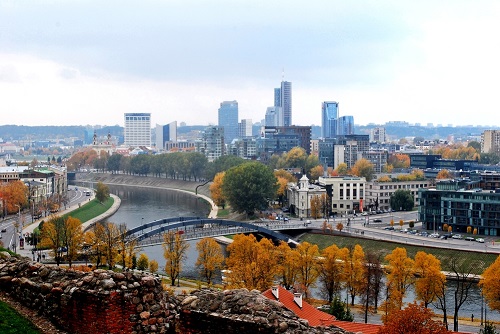Lithuania has a two-tier health insurance system, consisting of both public coverage and private providers. The public system is organised by the Compulsory Health Insurance Fund (CHIF), also known as valstybinė ligonių kasa, which was set up in 1993. There is also a growing private sector.
As an expat, you will be entitled to register with the public healthcare system if you are a permanent resident, or if you are a temporary resident and working in the country. Many expats opt for private cover as well, either as a top-up or to bypass the issues in the public sector. We will look at your options below.
How does the Lithuanian state health insurance system work?
Around 55% of the Lithuanian population are state-funded, including children under 18, old-age pensioners, disabled people, and those who are unemployed. The CHIF operates on a principle of universal coverage. It is funded from mandatory health insurance contributions, which are deducted from salaries and from the state itself.
As an expat, you will be entitled to register with public healthcare if you are:
- A citizen of the Republic of Lithuania or a foreign national permanently residing there
- A foreign national temporarily residing in Lithuania, provided that you are legally employed, and minor members of your family
- An unaccompanied foreign minor
- A foreign national who has been granted subsidiary protection in Lithuania
- A person to whom the Law on Health Insurance must apply under EU regulations on the coordination of social security systems
Most expats will come under the first category.

If you are an EU national and are resident in Lithuania, you will be entitled to treatment under the national healthcare system, as a result of reciprocal healthcare agreements with your home nation. You will be able to use your European Health Insurance Card (EHIC). Card holders can apply for medical care directly with their GP, as long as the practice has an agreement with their Territorial Health Insurance Fund (THIF) or teritorinė ligonių kasa.
You will be able to access healthcare services provided in private, public and municipal healthcare institutions, even if you are not insured under the national scheme, but you will have to pay out of pocket.
Your employer should register you automatically with the CHIF, but check that this has been done. If you are self-employed, you will need to sign up yourself. Consult the CHIF to find out what you need to do.
Your national health insurance contributions will be deducted from your salary and are currently set at 6.98% of your income.
The same amount is paid by self-employed people, and it is calculated from 90% of taxable income. You will need to make contributions of 6.98% from your minimum monthly salary until the last day of the current month.
If you are self-employed, it is advisable to pay compulsory health insurance contributions in advance.
On 1 January 2020, the minimum month’s gross salary was increased to €607, and the compulsory health insurance contribution was set at €42.37 per month.
If you are an expat and are not considered a permanent resident, you cannot be insured with the CHIF, unless you are employed, or else you have worked in Lithuania for six months and are registered with the Labour Exchange
If you are intending to use the public healthcare scheme, you should register with your GP, but, as above, make sure that the practice is CHIF-registered.
To register with a dentist, you will need to find a private practice, since dental treatment is not covered under the CHIF. Ask colleagues or friends for recommendations, or investigate using the net and the phone directory.

Registering with private healthcare in Lithuania
Lithuania is a destination for medical tourism. The private medical sector offers a high quality of care, combined with competitive prices: up to 25% of the costs in other countries. Many expats thus choose private cover, even if they are registered with the CHIF through their employer.
Private cover will also enable you to avoid some of the issues with public healthcare in the country, such as the lengthy waiting times. You may also opt for a policy that includes a dental plan. Lithuanian dental care is of a high standard, and dental tourism is a growing sector in the country.
Again, ask people you know for recommendations to find a local clinic, and do not be afraid to ask clinics and medics for testimonials. You may need to check with the clinic to see whether they will accept your health insurance, and you may also need to pre-approve any potential elective procedures with your provider.

